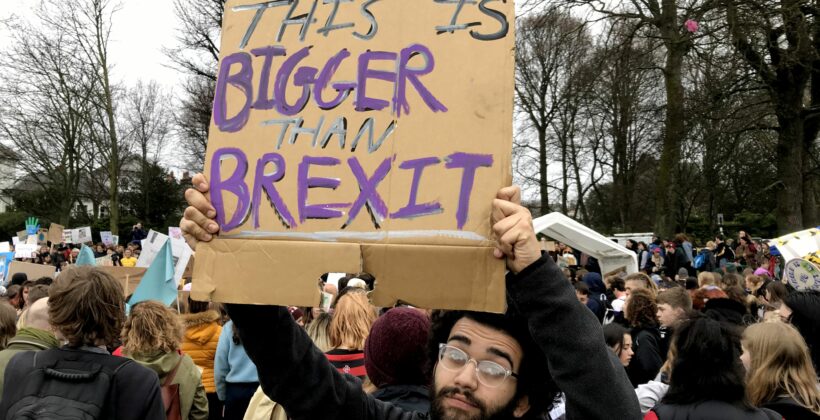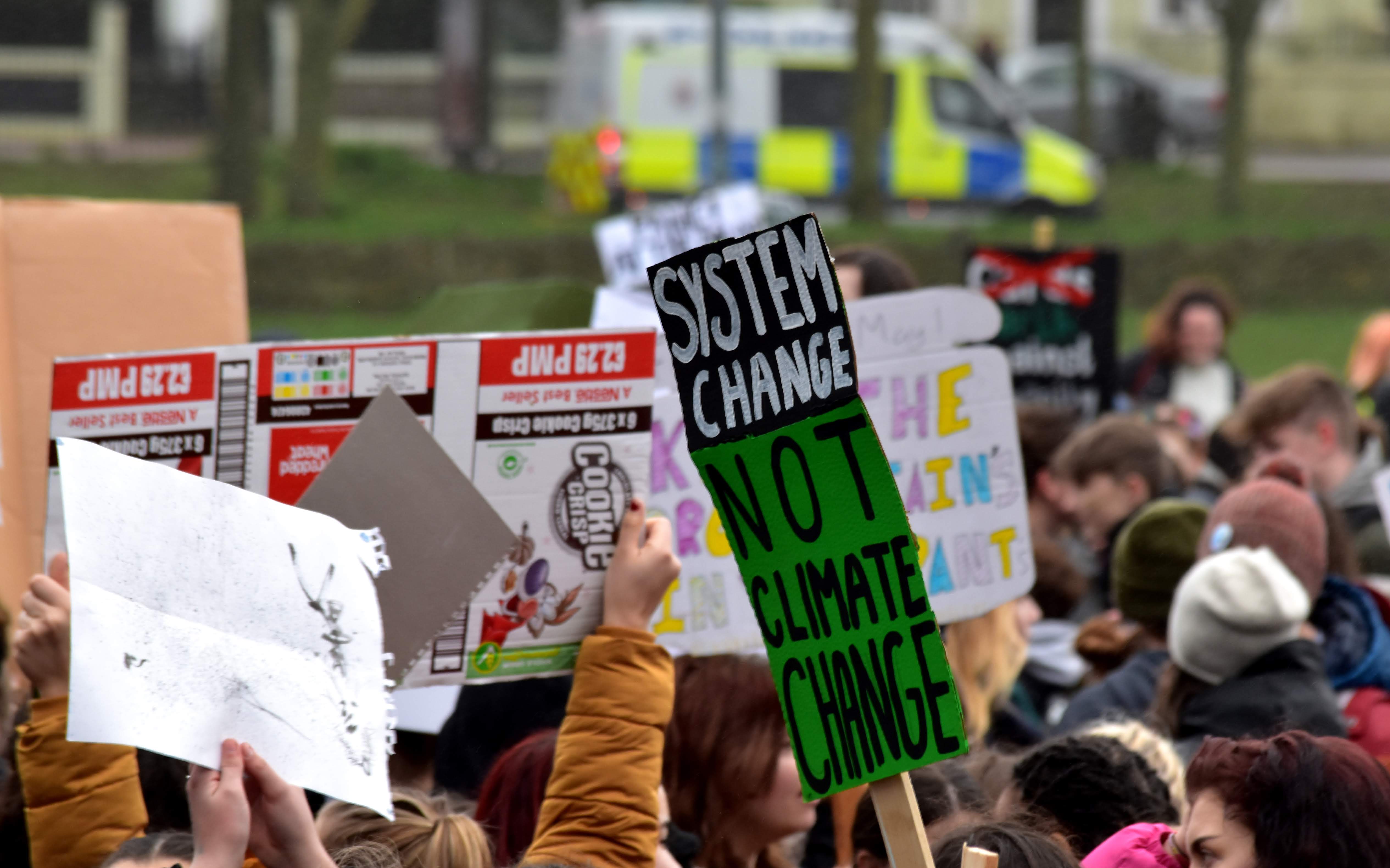Holding a Citizens’ Assembly on climate action is one of just three demands by the headline-grabbing activists of Extinction Rebellion, whose city-stopping protests now progress to local movement building. Yet many people don’t even know what a such an assembly is, even as the City Council in Oxford, UK, prepares to organise their own. But Frances Foley, of the Citizens’ Convention on UK Democracy, writing here for the Rapid Transition Alliance, says that a ground-breaking Irish experiment in deliberative democracy shows that citizens’ assemblies really can help deliver climate action.
A national roll-out of low-carbon public vehicles, state support for community energy generation, higher taxes on carbon-intensive sectors, incentives for responsible agricultural land use and carbon sequestering, government-backed planting of forests, an extension of bus and cycle lanes and climate change at the centre of all government policy making.
It reads like a Christmas list for a climate activist. A bold, comprehensive and realistic government commitment to taking climate change seriously. Real leadership, real ambition – a real shift.

Yet this policy programme comes not from the Green Party central office, nor from yet another environmental thinktank report. The 13 recommendations were reached through a serious exercise in democratic decision-making in Ireland. The government signed up and set up; the citizens turned up and scaled up. It was a show of good faith from every side – political class, citizenry, media. It was a leap of democratic faith.
In July 2016, the new government – led by Fine Gael, backed by independents – put forward a bill to establish a national-level Citizens’ Assembly to look at the biggest issues of the day. These included the challenges of an ageing population; the role fixed-term parliaments; referendums; the 8th Amendment on abortion; and climate change.
Citizens from every region, every socio-economic background, each ethnicity and age group and from right across the spectrum of political opinion convened over the course of two weekends between September and November 2017. The issue seemed daunting in scale and complexity, but the participants had been well-briefed and had at their disposal a line up of experts, scientists, advocates and other witnesses who would help them make sense of the material. By the end, citizens had produced a radical series of recommendations which went far beyond what any major Irish party was promising, surprising even the initiators of the process.
These recommendations mainly relate to energy production, transportation and agriculture, three of the biggest sources of Ireland’s carbon emissions. As a programme, they put a clear stake in the ground that will be hard to avoid or dismiss, not least because it was planted by citizens through an open and deliberative process. For successive governments, the recommendations should be seen either as a challenge, useful cover or a yardstick by which they can be judged, depending on their starting point.
[slide-anything id=’3472166′]
Indeed, whilst the ambition from the Irish Citizens’ Assembly is inarguable, the implementation is already proving a challenge. The Irish Government has pledged to reach net zero carbon emissions by 2050 and has already taken steps in this direction, with cross-party support for a substantial increase in community energy generation, government backing for offshore wind and solar, subsidisation of sustainable agriculture and a programme of green retrofitting for private homes across the country. These measures would make Ireland a leader in climate action.
As expected, the passage for some of the proposals through the Irish party gauntlet has not been smooth. The 8-hour long debate on increasing the carbon tax, for example, suggests that mixing deliberative and representative democracy still produces conflict and confusion. It is certainly clear that parliaments have to adapt and develop if citizens’ assemblies are ever to find their place in our modern democracies.
But the most encouraging move has been the simple acknowledgement that many of the barriers to implementation lie at the level of governance. The new Climate Action Commission, with a mandate to monitor climate action across government, should act as the governmental guarantor of the vision from the Citizens’ Assembly. Citizens’ proposals have themselves stimulated a review of internal government processes to stop their demands getting mired in party wrangling and government bureaucracy. By their very nature, the success of citizens’ assemblies can also provide an alternative vision of how decisions can be made – and in so doing shame political parties and parliaments into improving their decision-making practices.
Does the Irish Citizens’ Assembly constitute a case of rapid transition? In terms of its breadth, scale and vision, the experiment is impressive. But in terms of speed, deliberative processes are often criticised for being slow, unwieldly and costly. The response to this should be to ask what we’re getting: whilst an Assembly is not the most rapid vehicle for change – most serious processes take several months, if not a couple of years – the results, both in specific outcomes and in cultural or political shifts – can be astounding.
The proposals agreed by the Assembly over the course of just two weekends revealed the capacity of citizens to analyse, weigh up and decide on a course of action for their country – and to do so as a collective. The outcomes are clear, feasible and courageous. And most evidence suggests that those involved in these processes end up not only proud of their recommendations, but with a renewed faith in the abilities and good faith of their fellow participants. In an era when democratic faith is waning, these processes help to find a way through the most difficult political issues and bolster belief in a democratic system. In this respect, deliberative democracy gives direction – both in policy and process.
In respect to climate change, this harmony between ends and means is particularly significant. The climate crisis is the most severe collective decision-making challenge of our times, one that demands courage, but also careful thought.

In facilitating this a Citizens’ Assembly is unique – even counter-cultural. In an era of short-hand media and short-term thinking, the Assembly offers a space governed by concentration, depth and independence. The individuals selected are not overshadowed by media, lobbyists or party whips, so they can debate and challenge each other, disagree – and change their minds. They are faced with complexity, with nuance, with no win-win solutions, and with the hard task of setting priorities for an uncertain future. Through this, citizens are made aware of the perils of easy solutions, one-line responses and playing for time. They can grow into the role and find not just “a voice” but a sense of responsibility and power.
Ireland’s example is also not isolated. Oxford City Council recently announced that it will hold an assembly, and the deliberative principles underlying how the assembly operates were put to extraordinary effect in one unlikely place. In the US, the ‘oil and gas state’, Texas used a series of ‘deliberative polls’ to investigate energy policy. The result was a shift in state policy that led to investment in renewable energy and a new renewable energy portfolio standard, which took took Texas from being second-to-last in the US in terms of wind power generation to first. Key to changing minds and policies had been including as observers in the process elected state officials, power company executives and the public utilities.
A Citizens’ Assembly on climate may lack the speed or dazzle of other solutions. It isn’t sensationalist and it doesn’t grab headlines. Yet being out of step with our current political environment, it may just provide the sobriety, sense and stability needed for citizens to make the leap into a post-carbon world. Deliberative democracy allows truth and justice to surface when the pace is slowed, values which should be rudders for societies in transitioning times. Paradoxically we need to slow down our thinking in order to speed up our transition. And when we do, we might see that those decisions made in stillness and slowness are the ones which sustain us.























